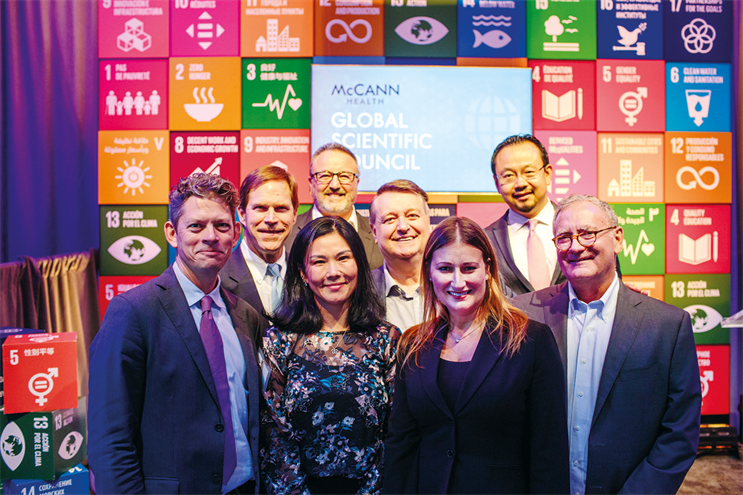
A global community of doctors, scientists, marketing and communications professionals gathered at the United Nations to be part of an event to launch McCann Health’s Global Scientific Council: a one-of-a-kind resource for clients and a platform for the company’s scientific experts to have a voice in medical advances of global impact.
The Council’s main aim is to help patients, healthcare practitioners and the world navigate and better understand the increasingly complex and changing world of health and medicine.
"‘Truth Well Told’ is a McCann mantra that dates back to 1912. The idea of truth and how it interplays with trust is a major focus for us in launching this initiative. Of course, debating the nature of truth is something as human beings we’ve been doing for millennia, so there’s nothing new in that, but progress and change of pace tend to influence what we perceive as truth," said Charlie Buckwell (pictured below), MBA, president of McCann Health’s Global Scientific Council, in his opening remarks.

McCann Health is not trying to address truth in all of its guises, Buckwell said, but it is looking to find new ways to help healthcare professionals, patients and the public know that the information they’re accessing is well-founded and comes from a trusted source.
"We’re trying to do this in a time of increasing complexity," he added, pointing to information overload and misinformation, new practices, increasing stakeholders and more.
McCann Health created the Council that represents 450+ strong community of PhDs, MDs, pharmacists and other scientific experts from across its global network to bring higher-level solutions to clients and make an impact on the world in key areas of medical need. The Council is led by three highly respected industry professionals. Buckwell; Dan Carucci, MD, PhD, appointed global medical director for McCann Health earlier this year; and Alice Choi, MPH, PhD, executive director for the group.
Following Buckwell’s intro, Thomas Goetz, author and former executive editor of Wired, took the stage to discuss the principles he’s gleaned throughout his career around communicating science to a lay audience.
"Science is half of it: If you’re a scientist, your work is invaluable, but remember the other half is communication," said Goetz.
The true basis of effective, evidence-based understanding is conversation, not presentation. We need to seek better understanding and involvement with evidence through the tools of conversation
John Cahill, global CEO, McCann Health
Simplifying the complex
A panel of industry experts went on stage after Goetz, to discuss and debate the question ‘Are advances in science outpacing our ability to communicate them?’. The panel, moderated by Choi, included Kristin Pothier, global head of life sciences strategy at EY-Parthenon and author of Personalising Precision Medicine: A Global Voyage from Vision to Reality; Zhen Su, MBA, MD and chief medical officer for N.A. at EMD Serono; and C. Michael Valentine, FACC, MD and president of the American College of Cardiology.

With medical advances moving at such a fast pace, Choi (pictured above) asked the panellists how they conveyed complex information to broad groups of stakeholders in a timely fashion, especially with people’s lives on the line. "You need clear messaging and a clear communications path – it helps people from being frustrated and it gets quicker results," said Pothier.
Su brought up the importance of understanding each group’s needs, whether it’s clinicians, regulators, patients, pharmacists or so on. "It requires a great deal of tailored messages and needs to be coordinate in a fashion where you have the same information, but you’re highlighting differences. And it requires a lot of help from the health communications industry," he said.
Information overload is even causing patients to question their doctors’ counsel, said Valentine. "Patients are getting information from so many places. We are looking for solutions for our members to drive this information to patients and we need help," he added.
The idea of truth and how it interplays with trust is a major focus for us in launching this initiativeCharlie Buckwell, president, McCann Health Global Scientific Council
Tackling grand challenges
Along the same lines, Pothier said the industry must stay true to science. "If you don’t know something, find someone who does so you don’t have smoke and mirrors," she advised.
And Su said it’s crucial for partners in this field across medicine and communications to have a "shared passion and mission".

After the panel, Carucci (pictured above) unveiled McCann Health’s Grand Challenges in Health Communications, a call to the world’s communications community to come together to help solve some of the most daunting medical issues of our time. Carucci explained that the term "grand challenges," means "ambitious but achievable goals that harness expertise across disciplines and have measurable outcomes and impact."
The Council selected four areas to explore: antimicrobial resistance, the increasing likelihood of a post-antibiotics era in medicine; precision or personalised medicine, which are new treatments targeted to individuals and their genetic profiles rather than an entire population or type of people; mental health, which is a massive topic with major communications challenges for both doctors and patients; and obesity, a complicated issue that varies in markets all around the world.
With greater prioritisation of health communications globally and by addressing the grand challenges, progress under each topic could take "a giant step forward", he said. He believes, however, that making progress will require strong public-private sector partnerships and cross-disciplinary approaches bringing together science, technology, innovation, creativity and communications.

Talking truth
McCann Health global CEO John Cahill (pictured above) wrapped up the event with this: "Staying true to the science – we need to make the evidence more understandable and approachable to stakeholders therefore making it more meaningful to the recipient – we can do this by staying faithful, but relevant, through evidence-based storytelling.
"The true basis of effective, evidence-based understanding is conversation, not presentation – as an industry, we need to seek better understanding and involvement with evidence through the tools of conversation," he said.


